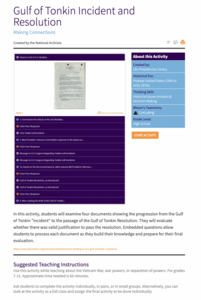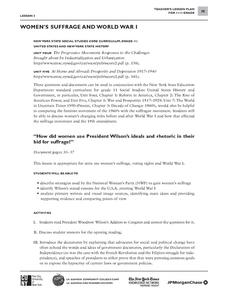Curated OER
The Three Branches of Government
Sixth graders discover details about the 3 branches of government. In this primary source analysis instructional activity, 6th graders examine documents and images from the Library of Congress to investigate the structure of the U.S....
Curated OER
Drums of War
Students research the political climate prior to major American wars of the past, then reflect on the current call for power to confront Iraq. They create posters using newspaper articles and headlines to highlight the major opinions of...
Curated OER
George Washington as Military Leader
Students will analyze historical evidence including primary sources to evaluate George Washington as a military leader. The reading begins with Washington's understanding of the issues related to military power, continues with his use of...
Curated OER
What if the Senate were Reformed on the Triple E Model
Students investigate what the Canadian Senate does and what reform would do to the power relationship between the Prime Minister and the Senate.
Curated OER
Ohio Statehouse History
Fourth graders examine the history of the Ohio Statehouse and order the major historical events in its development. The lesson traces the development from the time of Ohio's vast wilderness to the house's completion in 1861.
University of Wisconsin
Analyzing Presidential Campaign Propaganda
Campaign propaganda has evolved from 1952 through the presidential election of 2008. A social studies activity prompts class members to analyze the devices used in ads and political cartoons, noting strategies they believe would work to...
DocsTeach
Gulf of Tonkin Incident and Resolution
They sunk our battleship! An engaging activity focuses on the Gulf of Tonkin Incident and the sinking of the USS Maddox. Young historians learn how it increased tensions leading to the Vietnam War and read through a first draft of the...
City University of New York
Woman's Suffrage and World War I
How did women use President Wilson's ideals and rhetoric in their bid for suffrage? To answer this essential question, class groups analyze primary written documents and visual images.
National Endowment for the Humanities
The Rise and Fall of Joseph McCarthy
"I have here in my hand . . ." The war against Communism and Joseph McCarthy’s place in it are the focus of a series of lessons examining postwar America from 1945-1954. Joseph McCarthy takes center stage in this, the final lesson...
Center for Civic Education
Orb and Effy Learn About Authority
Simplify the teaching of the US Constitution with this primary grade social studies lesson. While reading a fun story about an imaginary place called Bubble Land, children learn about the concept of authority and the importance of...
National History Day
Why Did the United States Enter World War I in 1917?
World War I was the first major conflict on a global scale. Using primary documents, learners determine why the United States chose to enter World War I when it did. After analytical writing and group research, the causes of America's...
Curated OER
History of Congress and Government
Seventh graders will perform research that helps them to learn about government and the democratic way of life. This form of life serves as a basis of reflection for the basic forms of life on earth.
Curated OER
Law Day: Constitutional Law Outline
Students receive information about laws. Some of the categories include powers of the federal government, federal powers vs. state powers, and the Bill of Rights. It is in an outline form that looks like the student follows along with...
Curated OER
The Role of the Executive Branch in the Lawmaking Process
Students research the Executive Branches role in making a law. In this law making lesson plan, students study the history of the Constitution and see how much power the President has in making a bill into a law. Students then research on...
Curated OER
Comparing the House and Senate
Students create posters and write descriptions on the responsibilities and powers assigned to the United States Senate and House of Representatives. Students compare and contrast the two houses' powers and responsibilities as well as...
Curated OER
LEGISLATIVE BRANCH
In this U.S. branches of government worksheet, learners respond to 15 fill in the blank questions regarding the powers of the legislative branch of government.
Curated OER
Should the United States Have a Central Bank?
Students assess the validity of a national bank. They study the importance of McCullough v. Maryland. They review the arguments of Hamilton and Jefferson. They analyze the Tenth Amendment and the debate over state v. federal power. They ...
Curated OER
Launching the New U.S. Navy
Learners analyze United States Constitution, locate general references to common defense, and specific references in document to U.S. Navy. Students then respond to questions on Document Analysis Worksheet, and discuss relationship...
Curated OER
The Cherokee Removal
Eleventh graders examine the issue of Cherokee removal from the perspectives of Andrew Jackson, members of Congress, and members of the Cherokee nation. They adopt the perspectives and engage in debate over the issue of Cherokee removal.
Curated OER
What is an Iron Triangle?
High schoolers discuss how interest groups, congress and the executive branch play a role in policy making to make up the Iron Triangle. They list the three points of the Iron Triangle and explain the role they have on public policy....
Curated OER
US Government: The Checks and Balances System of the US Constitution
Young scholars examine the responsibilities of the 3 branches of U.S. government. In this checks and balances lesson, students identify the powers of the legislative, executive, and judicial branches of government. Young scholars share...
Curated OER
The U. S. at War
Students examine reasons for going to war. In this foreign policy lesson, students analyze the reasons the U.S. entered the the War of 1812, the Mexican War, the Spanish-American War, World War I, World War II, the Korean War, the...
Curated OER
Constitution Worksheet
In this U.S. Constitution activity, learners respond to 63 short answer questions about Articles I-VII of the American plan for government.
Curated OER
Stepping Inside the Flowchart: How Does a Bill Become a Law?
Students explore the steps a bill must pass through to become a law and create a flow chart that maps the complexities of the process. They research the committees that are involved in a bill that relates to energy policy and the...
Other popular searches
- Delegated Powers of Congress
- Expressed Powers of Congress
- Express Powers of Congress
- Implied Powers of Congress
- U.s. Congress Powers
- Congressional Powers
- The Powers of Congress
- Powers of Congress Song
- Us Congress Powers
- Expressed Powers Congress
- Explicit Powers of Congress
- Expess Powers of Congress























